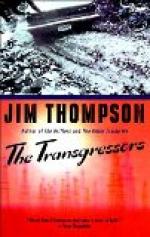Rapidly he pictures the scenes of intimidation he has witnessed in the west and northwest. Is New York chained to the wheels of the Plutocratic chariot?
As the first sign of sympathy answers his appeal, he urges upon his audience the necessity of declaring anew the independence of the people. The fervor of his speech affects the crowd; the indescribable impulse to yield to the will of a fellow-man who commands the power of oratory, asserts itself. At the declaration of a principle of government which is trite in itself, there is a scattered cheer; an apt epigram evokes a storm of applause. Trueman wins the full sympathy of his audience; they are his to command.
“I am expected to address an audience at the foot of Barclay street. It will afford me unbounded pleasure if I may tell them that the meeting will not be disturbed; that you have decided to apply to politics the same spirit of fair play that you would demand in a street brawl.”
“We’re with you,” cries a man. “You’re all right.” Trueman steps from the music stand. The crowd gather about him, shouting and cheering for him.
“This is an Independence parade,” some one shouts.
“Forward, march, for Barclay street!” becomes the general shout. Trueman is pushed on toward the edge of the Battery Park till the line of carriages in which some of the members of the parade were to ride is reached. He is lifted into one of the carriages and the march for the West street stand is begun. The line of march leads along State street to Battery Place; here it turns west to the river, and thence up West street. The traffic which chokes that thoroughfare in the day is absent and the broad expanse of street affords an excellent concourse.
With the clashing strains of three bands, the shouts of thousands of men, the flickering lights of torches and Roman candles, Trueman approaches the audience which has been impatiently awaiting him. Flushed with the pride of his victory he mounts the stand to address ten thousand men in the citadel of Plutocracy. His advent in New York is a signal triumph.
CHAPTER XIX.
DEPARTURE OF THE COMMITTEE.
By the last election for President a man has been put in office who is the acknowledged tool of the Trusts and Monopolies. He has avowedly sealed his independence by accepting a nomination brought about by the ring leader of a syndicate of Railroad Magnates and Steel and Oil Kings.
The people are in such a depressed condition that it is believed no determined opposition to the dominant party can be conducted. So this man is a candidate for re-election. The few intrepid men who succeed in keeping the people’s party in the field are derided and denounced as anarchists. Their very lives are threatened, and in one instance a Governor of the people being elected, he is immediately assassinated. But for the certainty of the Plutocrats that their money will win them a victory, all the leaders of the Independence party would be forcibly done away with.




